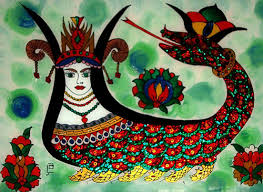Two Women of Mardin v ISIS
Mardin, a stone-carved historic hillside city in southeast Turkey whose buildings gaze south towards Syria and the Fertile Crescent, boasts two famous women.
The first is the colourful Shahmeran, half-woman half-snake, a legendary creature from the shared mythology of ancient Mesopotamia. Pictures of her bold green and red image adorn the streets.
The second is a much younger addition to the city’s history, the 26 year-old co-mayor, Februniye Akyol. Shy and self-effacing, dressed simply in a white jacket, she is the first representative of the ever-dwindling Syriac Christian community to govern one of Turkey’s metropolitan municipalities.
She has agreed to a rare interview, and we sit together on the elegant white sofa of her Mardin office.
Earlier I had watched her give a refreshingly brief speech to assembled bigwigs, marking the official rehabilitation of the city’s main street, a 9.2 million euro project funded by the European Union to promote tourism. Mardin, already part of a United Nations-backed scheme for a Silk Road cultural corridor, is nothing if not ambitious. Next it plans to become a “City of Peace”, hoping eventually for UNESCO World Heritage status.
As for Februniye, who had to change her Syriac name of Febronia Benno to a ‘turkified’ version to enter Turkish politics, her success was not so planned. “I never expected this career,” she tells me softly. “In the 1990s growing up as a child in this region, we experienced terrible times, persecution, the rape of women. Our situation was very bad. My father was arrested. For 16 days we didn’t know where he was. It affected me deeply.”
As the first woman from the local Syriac minority to go into higher education, attending Istanbul’s Marmara University in the Faculty of Insurance, she has now become a role model. Most Syriac graduates use their studies as an escape route for emigration to Europe. Instead, Februniye returned home.
Then, while she was doing an MA at Mardin’s Artuklu University in Syriac Cultural Studies, unique in Turkey, her political career was suddenly launched when she was chosen, together with a respected Kurdish veteran, to run for the BBP or Peace and Democracy Party, in last year’s local elections. “It is BBP policy always to have a woman co-mayor in their municipalities,” she explains.
In an overwhelmingly Muslim region of long-standing enmities between Turks, Kurds and Arabs, now further complicated by the ISIS threat on the doorstep, the task in front of Februniye is a daunting one.
“I had some prejudices against the Kurds,” she says, “but I realised I had to overcome them.” Now she is working alongside her former enemies and persecutors, promoting an ideology diametrically opposed to ISIS with its subjugation of women and violent intolerance of minorities.
“Isn’t this the same system the Syrian Kurds are using,” I ask her, “in their provinces of Kobani, Afrin and Jazira?”
“Yes,” she replies, “We are from the same families, just separated by the border. We all work together, no matter what race or religion, and have an equal quota for women on all our committees. Like them we want cultural, religious and linguistic freedoms for everyone.”
“Do you have contact with them?” I venture to ask, knowing the Syrian border is within sight of Mardin.
“Of course,” she replies with disarmingly frankness, “They come across for meetings from time to time.”
“But the border is closed. How do you manage that?”
“It can be opened when necessary,” she says simply.
Behind her delicate almost fragile appearance, I sense a steely resolve. She hands me her card and I notice her title is ‘Mrs. ’
“You are married?” I ask.
“Newly married,” she replies fingering her wedding rings as if still getting used to them.
It gives me the excuse to ask the obvious question, in this traditionally male-dominated society, where ISIS is knocking at the door:
“And how do the men feel about women sharing power?”
“They realise it has to be,” she replies, “It was even their idea.”
Strolling later past the renovated shop-fronts of Old Mardin I see the Shahmeran everywhere, in the famous jewellery, on key-rings, cushions and mirrors. I ask the shopkeepers about her meaning.
They explain how their Queen of Serpents is a source of healing and wisdom whose image reminds people to mend their ways, to shun evil and avoid betraying each other.
Mardin’s two famous women – one ancient, one young – will need to conjure all such powers here, if they are to survive the ISIS onslaught and defeat it.








An inspiring , hopeful story. What a bright, resilient young woman. She will do well and I hope we can plan a trip to Mardin sometime.
Glad you found her story inspiring – I do hope she gets a chance to prove herself and make a real difference. Mardin has a new airport and is surprisingly easy to reach. You can fly out from London via Istanbul on the same day, so I hope you make it sometime soon.